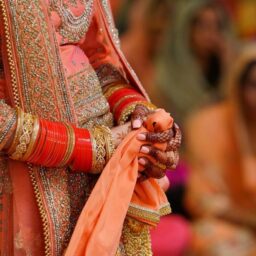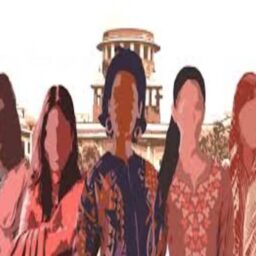INTRODUCTION
India is a land of various religions and each religion has its significant customs and traditions. The notion of marriage is no exception and the way of solemnizing it is also different across all religions. For Hindus, marriage is a “holy union”, whereas in Muslims it is contractual.[1] Such important differences are the reasons behind the formation of the personal laws in India so that each community can follow its rituals and traditions but within the ambit of the law.
Each community’s marriage and divorce are governed by their respective personal laws. For instance, the Indian Divorce Act, 1869 governs divorce among Christian couples but Hindu Marriage Act, 1955 (hereinafter referred to as HMA) is applied in the cases of divorce in Hindu couples, where ‘Hindu’ includes all Buddhists, Jains, and Sikhs in India.[2] This article specifically focuses on how the idea of ‘mental cruelty’ as a ground of divorce has evolved in India under HMA.
HISTORICAL BACKGROUND
Highly influenced by centuries-old traditions, ancient Hindu society had a belief that marriage is a “sacramental” bond for the upcoming seven lifetimes of the couple.[3] It was only after the passing of HMA that the concept of divorce being obtained by either of the spouse in a Hindu marriage was officially and legally recognized at large in India.[4] Due to deep-rooted cultural ideologies, divorce was hardly linked to Hindu marriages earlier but over the years, the focus on the nature of marriage has shifted a bit more towards that of a contract.[5]
When the divorce was first introduced under Hindu Law, traditionalists believed it was an attack on Hindu marriage principles.[6] But considering the real-life situations in the modern world, it is not possible to carry forward the perception of marriage being wholly permanent in every single case. So, at the time of implementation of HMA, several grounds of divorce were introduced like insanity, conversion, the presumption of death, etc.[7] Finally, in 1976 the need was felt to add cruelty as a ground of divorce available to both husband and wife.[8] It includes physical as well as mental cruelty. We focus herein only on mental cruelty.
MENTAL CRUELTY & INDIAN COURTS
The word cruelty is not well-defined under Section 13(i)(a) of HMA.[9] It was done deliberately because giving it a definite explanation would limit its application; whether an act would amount to cruelty or not, cannot be judged based on some pre-decided fixed criteria. In a Supreme Court case, it was highlighted that since cruelty deals with human conduct, it becomes extremely tough to describe it.[10] The idea of cruelty is varying with changes in standard of living and development in social concepts.[11]
An attempt has been made by the court to explain it as “that conduct which inflicts upon the other party such mental pain and suffering as would make it not possible for that party to live with the other. In other words, mental cruelty must be of such a nature that the parties cannot reasonably be expected to live together.”[12] For an act to fall within the domain of mental cruelty, it should be of such a severe nature that living together under such situations is not bearable for a reasonable person.
But since every marriage requires some level of co-operation and adjustment, small quarrels and trivial disagreements are not mental cruelty. There is no “straight-jacket formula” to know what conduct is mental cruelty. In Samar Gosh v Jaya Ghosh[13], judges came up with some instances of mental cruelty like one-sided decision to not have a child after marriage, humiliating and abusive behavior with spouse intended to torture, constant petulance, and rude attitude, etc.
An important aspect is the decision of courts that denying sex to the spouse is mental cruelty. In Vidhya Viswanathan vs. Kartik Balakrishnan[14], it was held that refusing sexual relations with the spouse for a considerable amount of time without any valid cause would be mental cruelty. But on the other hand, marital rape is still ignored even though the Justice Verma Committee report suggested penalizing it. Technically, marital rape also leads to the infliction of mental (and even physical) cruelty on the wife when she is forced to have sexual intercourse with her husband against her wishes.
It is slightly disturbing that if courts agree on denying sex being mental cruelty, then there are no talks for uniform acceptance of the fact that forcing sexual relations on a wife is also a type of mental cruelty. Although Kerala High Court’s latest decision holding marital rape to be a valid ground of divorce is laudable where it discussed that the mere fact of marital rape not being a crime does not mean it can’t be a ground of divorce, the judgment itself does not solve the whole problem as a High Court’s judgment is not binding on everyone in the country.
Now, mental cruelty is not inflicted only upon women, but on men too. Just because Indian society is considered to be male-dominated, it is unfair to assume that it is only women who are at the receiving end of cruelty always. The most common cause of infliction of mental cruelty upon men is the false accusations on them under Section 498A of Indian Penal Code, 1860 by women. This section talks about punishment to the husband or his relatives if the wife is subjected to mental or physical cruelty.
In a case where the wife had lodged a false FIR under this section against her husband & his family members, the court declared that such an act led to the suffering of mental agony by the husband and was considered to be mental cruelty; the man was able to divorce her on this ground.[15] In another case[16] where the wife intimidated her husband that she will lodge a fake case on him regarding dowry, would kill her kids to frame the husband in murder charges also; court rightly held the wife guilty of mental cruelty and allowed her husband’s divorce plea.
Another legal point under cruelty was discussed recently in the case of Yusufpatel v. Ramjanbi where the Karnataka High Court believed that even though second marriage is legal amongst Muslims under Sharia Law, it might cause cruelty to the first wife in case her consent was not taken prior second marriage because “it is a matter of common knowledge that, women regardless of their religion and socio-economic conditions, detest their husbands contracting second marriage.”
The decision puts forth an understanding that even legal conduct may amount to mental cruelty in some specific facts and circumstances. For instance, in the case of a first wife who is sensitive enough to feel insecure with husband’s second marriage, the husband’s act may be cruelty but, in a case, where he can prove that his action of second marriage is neither an insult nor neglect to the first wife and latter’s consent was involved, then it might not classify as mental cruelty.
CONCLUSION
Mental cruelty is not only a ground of divorce that is difficult to define, but equally difficult to prove as compared to physical cruelty because one may be able to estimate the number of or type of physical injuries caused to a body but it is very tricky to determine the level and extent of emotional abuse and torture which makes one suffer mentally. This fact itself is an obstacle in way of laying down clear and definite laws regarding mental cruelty of all categories.
Until this term gets such a definite explanation under our legislations that would capture the essence of its meaning in all circumstances, the onus will continue to be on the Indian courts to give it the suitable interpretation according to the facts of each case that comes up before them. An act leads to mental cruelty or not, stays subjected to the judicial interpretations for proving it as a justifiable ground of divorce under Hindu Law.
Author(s) Name: Lovepreet Kaur (National Law University, Delhi)
References:
[1] Dr. Ashok Kumar Jain, Family Law-I (8th edn, Ascent Publications)
[2] Hindu Marriage Act 1955, s 2
[3] S Pothen, ‘Divorce in Hindu Society’ (1989) 20(3) Journal of Comparative Family Studies <http://www.jstor.com/stable/41602038 > accessed 17 August 2021
[4] Ibid
[5] Ashok Kumar Jain (n1)
[6] Som, Reba, ‘Jawaharlal Nehru and the Hindu Code: A Victory of Symbol over Substance?’ (1994) 28 Modern Asian Studies https://doi.org/10.1017/S0026749X00011732 accessed 19 August 2021
[7] Hindu Marriage Act 1955, s13
[8] Pothen (n 3)
[9] Hindu Marriage Act 1955, s13(i)(a)
[10] Shobha Rani v. Madhukar Reddi, AIR 1988 SC 121
[11] Sirajmohmedkhan Janmohamadkhan v. Hafizunnisa Yasinkhan, AIR 1981 SC 1972
[12] V. Bhagat v. D. Bhagat, AIR 1994 SC 710
[13] (2007) 4 SCC 511
[14] AIR 2015 SCC 285
[15] K. Srinivas v. K. Sunita, (2014) 16 SCC 34
[16] Mayadevi v. Jagdish Prasad, (2007) 3 SCC 136















